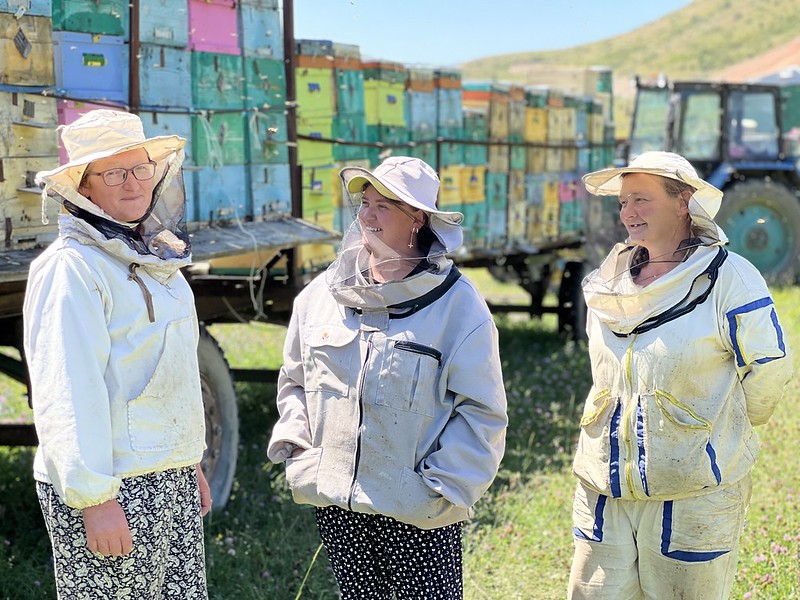Celebrating rural women and their contribution to beekeeping and honey value chain in Kyrgyzstan
October 16, 2024

Every year on October 15, we celebrate the International Day of Rural Women. This day emphasizes the essential role of women play in agriculture and their contributions to food production and sustainable development. A notable example of this is beekeeping, a field where women are emerging as leaders of change, representing significant progress toward gender equality.
The UNDP project "Aid for Trade," funded by the Government of Finland, is actively focused on strengthening honey value chains. A key aspect of this initiative is to overcome gender barriers and support women and vulnerable groups, particularly in rural areas. Over the next two years, the project aims to create 100 permanent decent jobs in the beekeeping sector across targeted regions, including Issyk-Kul, Osh, and Naryn, with 50% of these positions reserved for women.
Traditionally perceived as requiring strength and endurance, beekeeping has often been labeled a "men" occupation in many cultures. However, women are increasingly entering this field, proving that successful beekeeping depends more on knowledge, patience, and a connection to nature than on physical strength.

AFT beeking training participants.
To mark the International Day of Rural Women, we have gathered inspiring stories from our women beekeepers who participate in UNDP’s "Aid for Trade" project, that share how beekeeping has transformed their lives.
“For many rural women, like me, beekeeping has become not only a source of income but also an opportunity for economic independence. A successful apiary provides families with in-demand products—honey, propolis, wax, and other beekeeping items. Beekeeping also requires minimal investment, making it accessible for women eager to start their own businesses in rural areas,” says Dilbara Muratova, founder of the first women's beekeepers cooperative in the Issyk-Kul region.”

Dilbara Muratova, Head of the first women-led beekeepers cooperative.
“I started with one bee colony, but thanks to the knowledge and training I received with the AFT project, I was able to expand my apiary to dozens of hives. Now I export honey abroad. The training on implementing a queen bee system, which I participated in through the project, was especially beneficial for me,” shares Anastasia Kuznetsova, a woman beekeeper who participated in the “Honey Value Chains” under AFT project.

Anastasia Kuznetsova, beekeeper and participant of the AFT project activities under strengthening honey value chains.
“Although I learned a lot online, the in-person training from UNDP provided me with knowledge I couldn’t find on the internet. For instance, I now know how to properly insulate apiaries to prevent diseases among bees. I plan to learn how to sell honey through online marketplaces soon. Thanks to the modernization mechanisms created with project support, we also have the opportunity to upgrade our means of production without needing loans,” notes Natalia Sokolenko, a woman beekeeper.

Natalia Sokolenko, beekeeper and participant of the AFT project activities under strengthening honey value chains.
Women in beekeeping symbolize not only personal success and sustainable development in rural areas but also the achievement of gender equality in sectors predominantly occupied by men. The success of women beekeepers illustrates that agriculture can be both successful and sustainable when everyone participates, regardless of gender.
On the International Day of Rural Women, we celebrate these women's contributions to sustainable development and nature conservation. Women beekeepers exemplify how gender equality starts with providing equal opportunities and access to knowledge.

 Locations
Locations


